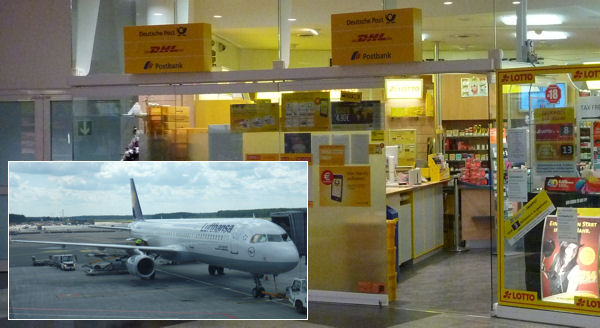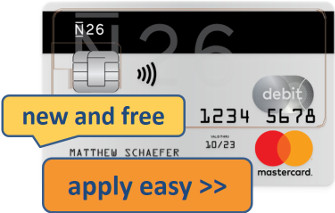Problems with the PostIdent for Foreigners
Banks have to verify the identity of their customers beyond doubt. This is not only because of their own interest, as this identity verification process is required by law.
At a bank branch office, this is done during a personal visit and presentation of an official identification document.

Sometimes difficult with foreign ID-documents …
As a personal appearance in an Internet bank (for example DKB or Comdirect) is not possible, there is another professional way: the German PostIdent-procedure.
This is how the PostIdent-procedure works (short description)
You take the PostIdent sheet (you obtain it from the bank mostly as a PDF to print) and your ID or passport in any branch office of the Deutsche Post. The postal worker types the ID data into the computer. Then he/she prints the document and the person to be identified signs it.
Subsequently, this document will be sent to the bank. That´s it. The PostIdent-procedure is free of charge for the customer. The fee will be paid by the bank.
No problems with the German identity card
People with a German identity card hardly have problems, as the PostIdent-procedure was optimized on the identity card.
PostIdent is optimized on the German identity card
All data – except for the postal code (zip code) – are stated on this German identity document.
Missing data and the reaction of the post
The post trusts you on the zip code
Although the opinions differ on whether the zip code is part of the address or not – after all, the postal code is not stated on the ID-card!
However, the citizen is always asked orally about the zip code of his/her place of residence. This statement is taken over into the identification process without any verification.
The post trusts you on the registration address
To legitimize the PostIdent-procedures, the ID-card or Passport can be presented. The ID-card contains the address, but the passport not!
Our experiences show that you are only asked orally about your address. Your statement will be taken over into the PostIdent-form without any verification. Just like with the postal code!

In the German passport, only the place of residence is stated, but not the address. For the PostIdent-procedure, the post trusts on the oral statements of the person to be identified!
Problems with foreign ID-Cards
If you have a foreign ID-Card or a foreign passport, then the Deutsche Post is not that insightfully.
We have quite some cases in which the PostIdent-procedure was refused due to omitting the statement of the place of birth. In the ID-card as well as in the passport, there is the statement „Place of birth“.
However, there are countries, like Switzerland and Spain, where the place of birth is not stated in the ID-card.
Not only readers have contacted us that had problems because their oral statement was not accepted. The Deutsche Post even refused to accept the PostIdent-procedure, because the place of birth was denied by other official documents (in the presented case, it was a marriage certificate).
Many foreigner cannot use the PostIdent-procedure
As a Special-Portal for domestic and international banking, we have contacted the Deutsche Post and asked what foreigners should do to be able to successfully complete the legitimating through the Deutsche Post.
The response of the post was diplomatic and shocking at the same time
The Deutsche Post pointed out that the PostIdent-procedure is a bulk-procedure, which is performed millions of times each year. A standardized process with about 50,000 employees, which have to be trained, takes place in order to maintain the error rate as low as possible.
One cannot identify persons, whose identification documents do not contain all required data. Other complementary documents cannot be accepted.
This means, conversely, that a whole lot of people cannot use the PostIdent-procedure, thus cannot open a bank account at the DKB or any other Internet bank.
An intolerable situation!
Europe of Free Movement?
We live in an increasingly integrated Europe, in which the free movement of persons, goods, services and capital exist. Every EU-citizen has the right to live and work in another member country of the European Union.
These rights are put into practice. More than one million citizens of other EU-countries live in Germany. Often, these are people who need our country for their development. Starting by trainees from Spain – who did not find a training position due to the local youth unemployment of about 50 percent – to scientists at a research center.
A lot of EU-citizens and foreigners from third countries have to waive on free checking accounts at the online bank, just because the Deutsche Post is inflexible for foreigners? For people with a German passport it surely is, as our own experiences (see above) have shown!
No further response from the Deutsche Post
When confronted – especially with the obvious discrimination against people with foreign identity documents – the Deutsche Post did not give us any further response.
We need a solution!
Out of background discussions, we know that some banks already work on another possibility of secure identification. Until then, however in Germany, one has to go the way though the PostIdent-procedure.
The 50,000 employees of the post that work on the identifications in thousands of branch offices throughout Germany, there are different levels of knowledge and experience. Despite all training measures, this is normal.
We know that it is possible in practice that foreigners in Germany can open their German bank account via PostIdent-procedure. If one post branch office rejects to make the identification, then try in another branch office.
In any case, you should always be polite and possibly take further documents for the identification, such as a birth certificate, if no place of birth is stated in your ID-card.
It is about exchanging tips and valuable information, so that other people also may benefit from the German bank accounts of direct banks. Thank you!

Maybe it is easier at post offices at airports, because they have more international customers? List of German post offices at airports.












What’s even more ridiculous is the Post not even allowing Residence Cards (Aufenthalstitel) issued in Germany for the PostIdent process! I recently opened a DKB account and tried to complete it using my residence card, only to be told by a very stern postal worker that I had to come back with my passport, proof of registration (Anmeldung), *and* a copy of a utility bill. My point was simple: 1) New residence permits such a mine feature the “neue Personalauswise” logo, which allow holders to make precisely those types of transactions much easier, and 2) the fact that a person has an Aufenthalstitel is living proof that a valid passport exists, as it is a requirement in the first place, and is printed along with its expiration date on the card itself. Still, she would not do it and made me come back with all the documents described above. Maybe my German will be good enough one day to have an argument with someone at the Post! 🙂
Today, I made a PostIdent for myself again (in the neighboring town) and on purpose, I chose to take the passport with me – in which no residential address is stated.
I mentioned the address orally and it was accepted in the identification form just as I stated it.
To my question, whether foreign ID cards and passports are accepted, they said: “Yes, sure … we have just had a French passport recently”.
This was no problem at all and it only took a little longer, because one must find the dates in the foreign documents in the other languages first.
The answer to another question was that there is a selection box in the computer, in order to determine whether it is a German identity card, a German passport or a passport of another country.
Sounds good, doesn´t it?
Hi,
Just discovered the website, it’s a great help and good job, I will read it in detail as I’m looking to open a free online account because I’m not liking some of the stuff I have experienced with the Deutsche Bank.
I just wanted to point out something you mention: The spanish ID card does have birth place in it (first statement in the back).
Regards from Munich
Wow, good hint. Thank you for your post!
Today I had issue with Deutsche Post. I could not finish the Post-Ident because of the missing city name in “place of birth” field. In Estonian passport there is only name of the country, not the city. Denied.